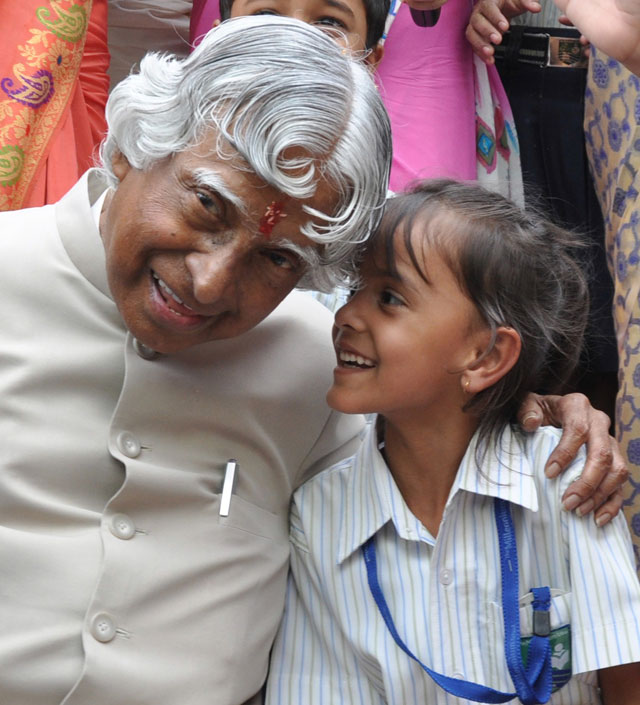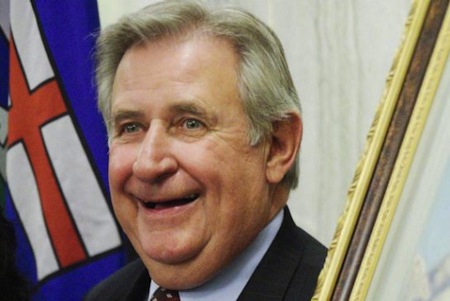Photo credit to The Hindustan Times.
Avul Pakir Jainulabdeen Abdul Kalam, who served as his country’s (chiefly ceremonial) president from 2002 to 2007, died today at age 83 after collapsing while delivering a lecture to students at the Indian Institute of Management in Shillong.![]()
Abdul Kalam was often nicknamed ‘the people’s president,’ and with good reason — he is being remembered fondly today across the political spectrum:
India mourns the loss of a great scientist, a wonderful President & above all an inspiring individual. RIP Dr. APJ Abdul Kalam.
— Narendra Modi (@narendramodi) July 27, 2015
Dr. Kalam…my mind is filled with so many memories, so many interactions with him. Always marvelled at his intellect, learnt so much from him — Narendra Modi (@narendramodi) July 27, 2015
Dr. Kalam enjoyed being with people; people & youngsters adored him. He loved students & spent his final moments among them.
— Narendra Modi (@narendramodi) July 27, 2015
Deeply saddened at the passing away of DrAPJ Abdul Kalam.A man of many parts-he won over the hearts&minds of a nation with his warmth&wisdom
— Office of RG (@OfficeOfRG) July 27, 2015
I worked very closely with Dr. Kalam as PM and I greatly benefited from his advice as President of our country:Dr Manmohan Singh — INC India (@INCIndia) July 27, 2015
He will be missed dearly and remembered fondly by every Indian.: Rahul Gandhi
— INC India (@INCIndia) July 27, 2015
last time when i saw Kalam sir! #RIPKalamSir pic.twitter.com/US9O25ztqj — Javed Khan (@im_javedkhan) July 27, 2015
V sad to hear that Dr APJ Abdul Kalam is no more. Nation has lost a real bharat ratna.
— Arvind Kejriwal (@ArvindKejriwal) July 27, 2015
As a leading engineer, he was the face of India’s nuclear weapons program — making him a living embodiment of an accomplishment that immediately bolstered India’s standing in the scientific community and on foreign policy. He was awarded the Bharat Ratna, India’s highest civilian honor, in 1997 and, with the success of India’s nuclear weapons tests in 1998, he became India’s ‘missile man’ before he became its ‘people’s president.’
Abdul Kalam was also an independent voice as India’s president. A Tamil Muslim, he was elected as president in 2002 in the wake of the anti-Muslim riots that so tarred the record of Gujarat’s first minister and now, prime minister, Narendra Modi.
Abdul Kalam belonged to no party — he’s the last truly independent to have been elected to the presidency. Moreover, he stood up to prime minister Manmohan Singh by initially rejecting a 2006 bill that would loosen rules on holding ‘offices of profit’ — the new law followed Sonia Gandhi’s resignation from several positions deemed to be offices of profit. Gandhi has served as the president of the Indian National Congress (Congress, भारतीय राष्ट्रीय कांग्रेस) since 1998, including its decade-long stint in power between 2003 and 2013.
He used the office of the presidency to great effect at home and abroad — and though he’s been described as apolitical, Pratap Bhanu Mehta argued in The Indian Express in 2007 that he conducted his presidency as the consummate politician:
Kalam was engaging in politics in the deeper sense of the term: he had an unerring instinct for what the people were looking for, he never criticised but only proposed alternatives, he levelled distinctions between people not by lowering the elite but by raising the aspirations of masses, and he relentlessly called attention to the fact that the Office was a means not an end. It is always possible to probe further into his motives and compromises. But he succeeded not because he was apolitical but because he had a sense of what people want in a politician: the capacity to project a future full of possibilities with conviction and sincerity.


